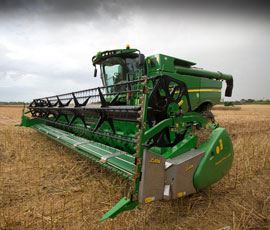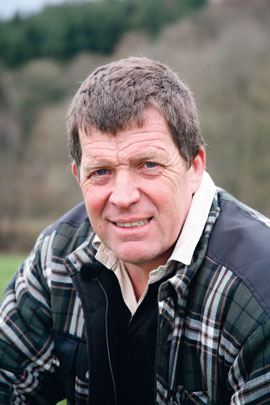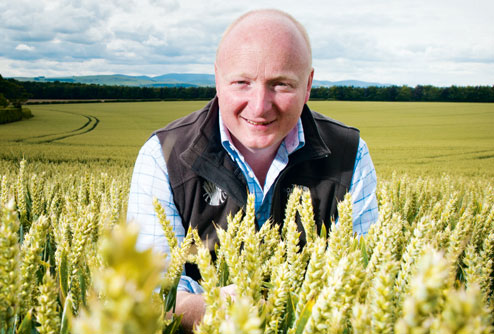Slow progress and poor yields dominate Barometer harvest

Slow progress combined with disappointing yields are making it a trying harvest for our northern and south western Barometers writes Gus Harley Russell.
Steve Lee
Crediton, Devon
Oilseed yields have been disappointing for south-west Barometer farmer Steve Lee and the outlook for wheat is not looking much better.
“We have cut all the oilseed rape and half the winter linseed area. The 80ha of Astrid yielded just over 2.5t/ha, about half that of last year,” said Mr Lee.
 “The five-year average is 3.7t/ha so we are very disappointed. Combines have been dodging the rain and have been forced to cut rape at anything between 10-16% moisture content.”
“The five-year average is 3.7t/ha so we are very disappointed. Combines have been dodging the rain and have been forced to cut rape at anything between 10-16% moisture content.”
The Wintalin linseed is combining really well despite being lodged in places. The estimated yield so far was a disappointing 1.9t/ha although this might improve as there was a tendency to be quite harsh with weight estimations, he said.
“I am not sure whether I will grow it again, which is a shame. I like the idea of plenty of break crops so that I can maximise my first wheat area. With a variety of break crops, I can stretch my rape in the rotation to one year in four.”
Next up on his combine’s menu will be the winter barley with about 200ha of contract cutting for his local customers before the harvester heads for the wheat.
“With regard to wheat I don’t hold out much hope. There is so much disease about I think farmers are going to be very disappointed.”
Looking forward to next week there will probably be 100ha to go at. “Einstein is the main variety, being early maturing and having a good specific weight, but it’s not looking good this year. The grain looks very shrivelled and I think people are in for a real shock, but we live in hope.”
Damage to soil structure being inflicted by harvesting in wet conditions is going to be the next problem. “What on earth are we going to do with it? The ground is already very wet and I can see us having to plough some of it. In a wet year, there is always a knock-on effect for the following crop.
“With regard to wheat I don’t hold out much hope. There is so much disease about I think farmers are going to be very disappointed.”
Steve Lee
“This year I have halved my bean area at the expense of grain maize. But this was probably not the year to do this as the beans might well be the crop of the year. I now regret not spraying a second fungicide on them for chocolate spot, because at the time they didn’t look great, but they have improved markedly due to the wet,” remarked Mr Lee.
“Looking forward to the grain maize harvest with trepidation, we have got around 90ha to cut. Of this, 50ha looks OK the remaining 40ha has looked awful, but is just beginning to improve. Some of the maize crops down here were burnt off when they were just 6in high,” he said.
Colin McGregor
Coldstream, Berwickshire

Catchy weather is hampering progress for northern Barometer farmer Colin McGregor where combine tracks, large flotation tyres and chains are proving their worth.
There are some 574ha of oilseed rape for the three combines to chew through and so far they had only cut about 77ha. Progress had been slow and yields were disappointing, said Mr McGregor.
“The likelihood is that as a grower group, we will be well below budget.”
Colin McGregor
“Yields are running at 3.9t/ha dried weight against our five-year average of 4.71t/ha. This year’s yields have been a bitter disappointment following last year’s spectacular average of 5.5t/ha. All the rape has been desiccated with glyphosate and so far the moisture contents are hovering at around 11-12% ahead of going into store.
The 50ha of Volume winter barley had been cut and baled. The six-row hybrid yielded 8.9t/ha, but had a disappointing specific weight in the 50s. “Not enough sun and too much rain was the problem,” commented Mr McGregor.
The 38ha of spring barley has been sprayed off with glyphosate in the hope that it will be harvested soon after finishing the rape, which should take a week.
The main focus later this month will be the 1,400ha of wheat. “We are worried about the effects of fusarium just like everyone else.
“Applying fungicides at the correct growth stage is key, our timings have been pretty good, but the weather has just been awful,” he said.
Vining peas have been cut and yields have not been encouraging. “The likelihood is that as a grower group, we will be well below budget.”
See more from our Barometer farmers
For hundreds of harvest photographs and the latest harvest news see Harvest Highlights

